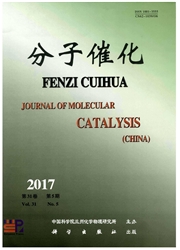

 中文摘要:
中文摘要:
富铝Cu-Beta分子筛具有优异的低温NH3-SCR性能,在汽车尾气脱硝中具有潜在的应用前景.我们考察了H2O、CO2、丙烯等气氛对富铝Cu-Beta分子筛NH3-SCR反应性能的影响.发现H2O会降低催化剂的低温活性,CO2则提高低温活性,丙烯对中、低温活性均有明显抑制作用.固体13C核磁共振显示丙烯在分子筛上形成链状脂肪烃积碳,导致催化剂的活性降低.Pt修饰使丙烯存在下低温NH3-SCR活性有所提高,但在中高温度下会催化NH3氧化产生大量的N2O和NO,从而降低了NO转化率.电子顺磁共振(EPR)和紫外-可见(UV-Vis)光谱研究表明,Pt的引入使部分孤立铜离子转化为簇状多聚态铜离子,会进一步加剧高温NH3氧化反应的发生,进而降低了催化剂的活性.
 英文摘要:
英文摘要:
NOx emission arising from consumption brings serious impact on public's lives and health. of fossil fuels increases significantly during recent years, and Selective catalytic reduction of NO by NH3 (NH3-SCR) as the most effective technique has been widely used in NOx abatement. However, the commercial V2O5-WO3-ZiO2 catalyst used in stationary emission has intrinsic biological toxicity and narrow operating temperature window, which is restricted in mobile emissions. In this study, 4% Cu/Al-rich Beta zeolite (Si/Al = 4) was prepared by aqueous CuE+ ion-exchange with Al-rich Beta zeolite synthesized from organotemplate-free approach, which shows excellent catalytic performance at low temperature in NHa-SCR reaction with 100% NO conversion at 175 ℃. It is a promi- sing DeNOx catalyst for application in diesel engine exhaust treatment. In order to mimic the real working environ- ment as exhaust gas, the effects of co-feeding 5% (V/V) n20- 10% (V/V) CO2 and 300 ppm propene on NH3- SCR performance of Cu/Al-rich Beta were also investigated. It' s found that the low-temperature activity of Cu/A1- rich Beta was decreased in the presence of H2O, while CO2 enhanced the low-temperature activity, and propene in- hibited the catalytic activity significantly at both low and medium temperatures from 150 to 500 ℃. All the components had little effect on the high temperature activity. Solid-state lac magic angle spinning nuclear magnetic reso- nance (MAS NMR) indicated paraffin as deposited carbon was formed from the polymerization of propene in the pores of zeolite. Cu/Al-rieh Beta catalysts doped with different amount of Pt ranging from 0.03% to 0.8% were prepared by incipient wetness impregnation of Cu/Al-rich Beta with aqueous solution of H2PtCl6·6H2O, and pro- pene tolerance of Pt-Cu/Al-rich Beta catalysts were investigated. It' s found Pt modification can indeed enhance the low-temperature SCR performance by 10% at 150 ℃ in the presence of propene. However, combined with am-monia oxidation e
 同期刊论文项目
同期刊论文项目
 同项目期刊论文
同项目期刊论文
 Density functional theory investigations into the structure and spectroscopic properties of the Ti4+
Density functional theory investigations into the structure and spectroscopic properties of the Ti4+ Framework Stability and Bronsted Acidity of Isomorphously Substituted Interlayer-Expanded Zeolite CO
Framework Stability and Bronsted Acidity of Isomorphously Substituted Interlayer-Expanded Zeolite CO Multinuclear Solid-State NMR Studies on the Formation Mechanism of Aluminophosphate Molecular Sieves
Multinuclear Solid-State NMR Studies on the Formation Mechanism of Aluminophosphate Molecular Sieves Interlayer Expansion of the Hydrous Layer Silicate RUB-36 to a Functionalized, Microporous Framework
Interlayer Expansion of the Hydrous Layer Silicate RUB-36 to a Functionalized, Microporous Framework 期刊信息
期刊信息
